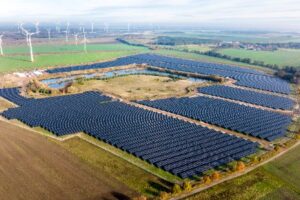Advantages and Disadvantages of Biomass Energy

Biomass energy is a form of renewable energy that is produced from organic materials, such as plants, animal waste, and wood. It has been used for centuries, but in recent times it has gained more attention as a cleaner alternative to fossil fuels. While biomass energy has several advantages over traditional fossil fuels, it also has its disadvantages. In this article, we will discuss the advantages and disadvantages of biomass energy.
Advantages of Biomass Energy
Being a natural resource of the planet that can be used to produce heat and even electricity, biomass energy has many advantages.
1. Renewable Energy
Biomass energy is considered renewable because it is derived from organic matter such as plants, crop residues, wood, and agricultural waste, which can be replenished through natural processes. As long as there is a continuous supply of these materials, they can be burned or converted into energy through various processes such as combustion, gasification, and fermentation, without depleting the source.
Moreover, the carbon dioxide released during the combustion of biomass is part of the natural carbon cycle and is absorbed by plants during photosynthesis, making it a carbon-neutral source of energy. Therefore, biomass energy can be considered a sustainable and renewable source of energy that can help reduce greenhouse gas emissions and dependence on fossil fuels.
2. Reduced Greenhouse Gas Emissions
Biomass energy can be produced from waste materials, such as agricultural waste and forestry residues. When these materials are burned to produce energy, they release carbon dioxide into the atmosphere. However, since the plants that produced these materials absorbed carbon dioxide during their lifetime, burning them does not contribute to an overall increase in greenhouse gas emissions. As a result, biomass energy can help reduce the amount of greenhouse gases in the atmosphere.
3. Reduced Dependency on Fossil Fuels
Biomass energy can help reduce our dependency on fossil fuels, such as coal, oil, and natural gas. Since biomass energy is a renewable resource, it can be used as a substitute for traditional fossil fuels.
Unlike fossil fuels, biomass is a renewable energy source that can be produced and replenished relatively quickly. Because of this, biomass has the potential to reduce our dependence on fossil fuels, which are non-renewable and contribute to greenhouse gas emissions.
This can help reduce the amount of greenhouse gases emitted by burning fossil fuels, which can lead to a reduction in the negative impact on the environment.
4. Energy Security
Since biomass energy can be produced locally, it can help increase energy security in the United States. In countries that rely heavily on imported fossil fuels, biomass energy can become a domestic source of energy that can slowly replace conventional energy produced from coal, oil or natural gas. This can help reduce their reliance on foreign energy sources, which can be unreliable and subject to price volatility.
5. Job Creation
The production of biomass energy can create jobs in various sectors, such as agriculture, forestry, and energy. This can help stimulate economic growth and development in rural areas, where these industries are typically located.
Disadvantages of Biomass Energy
The combustion of biomass for heat or power production releases some emissions into the atmosphere, and this means that biomass can’t be considered as clean as solar, wind, hydro or geothermal power.
1. Cost
The cost of biomass energy varies depending on a variety of factors, including the type of biomass used, the technology used to convert it into energy, and the scale of the operation. Generally speaking, the cost of biomass energy tends to be higher than that of fossil fuels, such as coal or natural gas, due to the higher costs associated with harvesting, transporting, and processing biomass.
However, the cost of biomass energy can be offset by several factors. For example, biomass energy is a renewable energy source, so it can provide long-term cost savings by reducing dependence on expensive and finite fossil fuels. Additionally, biomass energy can provide economic benefits by creating jobs in the biomass industry and reducing dependence on imported fuels.
2. Land Use
Land use is an important consideration when it comes to biomass energy. Biomass energy is generated from organic materials such as crops, forest residues, and agricultural waste. These materials require land to grow and cultivate, which can have implications for land use and land management practices.

Biomass energy from wood is renewable because trees can be planted and regrown within our life time, image source: Pixabay
To ensure sustainable biomass energy production, it is important to consider the impact of biomass production on land use. For example, large-scale monoculture plantations can have negative impacts on soil health and biodiversity. Therefore, it is important to ensure that biomass production is integrated with other land uses and that it is done in a way that promotes sustainable land management practices.
Furthermore, it is important to consider the trade-offs between land use for biomass production and other land uses, such as food production and conservation. In some cases, the use of land for biomass production may compete with other land uses, which can have negative environmental and social impacts.
3. Air Pollution
While biomass energy is a renewable and carbon-neutral energy source, it can also contribute to air pollution if not produced and used properly. The combustion of biomass releases pollutants such as carbon monoxide, nitrogen oxides, particulate matter, and volatile organic compounds, which can have negative impacts on air quality and human health.
To mitigate the impact of biomass energy on air pollution, it is important to use clean and efficient combustion technologies. This includes using advanced combustion systems, such as gasification and pyrolysis, that produce fewer pollutants and have higher energy conversion efficiencies. It also involves properly maintaining biomass combustion equipment and using proper fuel preparation and storage techniques to minimize emissions.
4. Water Use
Water use is an important consideration when it comes to biomass energy production. Biomass energy production can be water-intensive, particularly in areas where water resources are limited or where biomass production competes with other water uses, such as agriculture or drinking water supply.
To minimize the impact of biomass energy production on water use, it is important to use water-efficient biomass production techniques. This includes using drip irrigation systems and other water-efficient technologies to reduce water use during crop growth and management.
Additionally, the selection of biomass feedstocks can also impact water use. For example, some biomass crops, such as switchgrass and miscanthus, require less water than traditional crops like corn or soybeans, making them more suitable for areas with limited water resources.
Another important consideration is the potential impact of biomass production on water quality. Biomass production can impact water quality through the use of fertilizers and pesticides, as well as through runoff from agricultural fields. To mitigate these impacts, it is important to use best management practices, such as using organic fertilizers, planting cover crops, and minimizing tillage.
5. Sustainability
Biomass energy has the potential to contribute to sustainable energy systems, but its sustainability depends on a variety of factors, including the type of biomass feedstocks used, the production and conversion technologies employed, and the impact on the environment, economy, and social well-being.
To ensure the sustainability of biomass energy, it is important to promote the use of biomass feedstocks that are produced in a sustainable manner. This includes using biomass that is produced from agricultural or forest residues, waste materials, and dedicated energy crops that are grown using sustainable land management practices and do not compete with food production or conservation.
Conclusion
In conclusion, biomass energy offers several advantages as a renewable energy source, such as its ability to reduce greenhouse gas emissions, provide a reliable and diversified energy supply, and support rural development. Additionally, biomass energy can help to reduce waste by utilizing organic materials that would otherwise be discarded.







